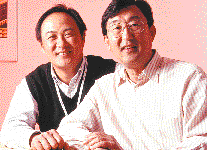MIDAS OF MEMORY
PAGE 2 OF 6
| Suddenly, Kingston was the only lemonade stand on the block. In god they trusted, all others paid cash. |
The more memory installed in a computer, the more quickly and fluidly it executes data-intensive applications. Memory can be analogized to the working space of your desktop. If your desktop is too small, you're slowed down by having to keep going back and forth to and from the file cabinet to retrieve and return documents. Likewise, if your computer lacks ample memory, your processor is forced to keep retrieving and returning data to and from the hard drive--analogous to the file cabinet--with its comparatively glacial access times. All that reading and writing to and from the hard drive can slow operations to a crawl.
The current standard 8 megabytes of RAM is quickly becoming inadequate as more and more computers come bundled with icon-based graphical interfaces like Windows 95 and Mac OS which allow multiple applications to be loaded simultaneously. The fever to upgrade to 16 megs, or even 32 or more megs, is a beneficient disease from Kingston's standpoint.
Tu figures his company commands 5-7% of the world memory market. His competitors are many. On any given day, a little sloppiness, a day's absence, even a long coffee break at the wrong time can cost a missed buying or selling opportunity that in turn could lose the company $50 million. That's why Tu will never sit in a corner office with his door closed. From his nondescript cubicle on the main floor he can keep his eyes and ears to the market and issue a quick corrective suggestion if he detects a misstep.
Kingston has created a brand name that enjoys a quality reputation. It tests every cell on every chip on every module it ships (128 million cells on a 16 meg module), compared to the industry standard of 5%. Kingston also enjoys the high regard of vendors like Samsung, Motorola and Hitachi who gladly give Kingston the inside track in times of shortage because they know Tu and Sun are playing for the long haul.
Kingston was founded in 1987, the product of opportunism and keen dealmaking. That year a shortage of 1-meg surface-mount chips put computer companies in dire straits. Since all the manufacturers had standardized to fit the surface-mount chip nobody could ship their computers. Tu and Sun hit on the idea of substituting a slightly bigger, older chip that performed and functioned identically. This abundant chip needed only slight modifications to fit into surface-mount slots.

John Tu (right), the humble marketing genius, and David Sun, the dynamic engineer, form a perfectly complementary duo.
They took the SIMM design to the president of Everex Computers who immediately asked for 50,000. Tu and Sun declined. Instead they offered Everex the design for free if it would manufacture the SIMMs and sell the surplus at cost to Kingston. Everex jumped at the opportunity.
Suddenly, Kingston was the only lemonade stand on the block. In god they trusted, all others paid cash. As soon as they got the cash, they turned around and resupplied themselves.
"I told David this is like making cookies," Tu recalls. "There's no technology involved." Tu figured that their competitors would catch on and simply copy them. They would be out of business within six months, he told Sun.
Sun, the more flambouyant of the two, disagreed, and just to make things interesting, proposed a wager.
"I had always wanted a Jaguar," says a chagrined Tu.
By 1988 sales skyrocketed to $12 million and the bet faded from memory. The PC market was booming and Kingston's revenue and product line kept pace. New computer manufacturers spread like viruses and each system required its own unique memory module. Kingston's biggest boost came in 1990 when Microsoft introduced Windows 3.0, an operating system that required far more than the 2-megs of memory than usually came with off-the-shelf computers. That demand pushed Kingston past the $100 million mark. Tu had clearly lost the bet. He remembered it a few days before Sun's birthday and made a call to a local Jaguar dealer before leaving on a business trip. On Sun's birthday Tu called him from out of town at the precise moment when he knew Sun would be home celebrating. PAGE 3
| PAGE 1 | 2 | 3 | 4 | 5 | 6 |
CONTACT US
|
ADVERTISING INFO
© 1996-2013 Asian Media Group Inc
No part of the contents of this site may be reproduced without prior written permission.
